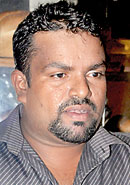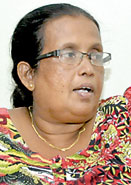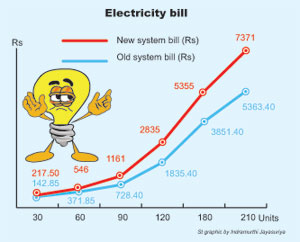News
Panicking households pull plug on everyday gadgets to beat power price hike
View(s):‘Keep calm and kaluwaray indapalla’ urge internet activists
By Aanya Wipulasena
The controversial electricity price hike is forcing many families to switch off staple gadgets such as fridges, shun their washing machines and share living spaces to adapt to the controversial electricity price hike.
In contrast, other home owners contacted through the Colombo Housewives’ Association declared that they couldn’t cut down on monthly power bills ranging from Rs.8000-15,000 because the hot weather made it necessary to have the fans and air conditioners on regularly.

L.A. Jayanpathi
Ayurvedic doctor Padma Weerasinghe, 55, of Kesbewa, has a monthly bill of Rs.2000-3000 and expects this to double when the price increases take hold. She and her husband, also an Ayurvedic doctor, are reasonably well-off. But she says the increases will force changes in family habits.
Mrs. Weerasinghe has decided to limit usage of most electrical equipment at home. “This is a hard decision but we really can’t afford the luxury of unlimited electricity any more. We already cut down the use of certain items after the previous price hike in 2010,” she said.
She has discarded her washing machine, and the couple and their four children decided to iron clothes just once a week. The family has stopped using garden and porch lights and started to build a pipe well to draw water instead of the electric motor pump. They have begun using mortar and pestle instead of an electric grinder.
“People I know have stopped offering visitors cool drinks now, and they even hesitate to switch on the fan when a visitor comes. This is indeed a sad time for the people of our country,” said Mrs Weerasinghe.
After the 2010 tariff increase the family switched from ordinary bulbs to Compact Fluorescent Lamps (CFL). “Now we are going to use LED bulbs which are expensive but save electricity better,” Mrs Weerasinghe said. “We can’t think how we can possibly cut down our electricity usage any further.”
Mrs S. Perera, 44, from Narahenpita said her family now assembles in one room in the evenings to do their individual work.
“My children did not like this idea at first but we had no option but to go ahead with it. Now, in the evenings, my two daughters do their homework while my husband and I do our office work in the same room,” she said. They have also stopped using the refrigerator, switching it on only when it is essential.
In 2010, the CEB published a list of habits the public could adopt to conserve electricity. It included measures such as controlling the use of lighting, using CFL bulbs or tube lights and designing houses that bring in more natural light. Homeowners such as Mrs Weerasinghe point out that they have already followed most of these measures and have no more conservation options available. All she could do now is to stop using electrical equipment as much as possible.

Padma Weerasinghe
“We have started to switch off all the lights in the evenings and stay in the garden. This way we don’t have to switch the fans on too. My son brings his books out to study during this time,” Mrs Weerasinghe said.
Architect Asoka Bandara of Boralesgamuwa said more people wanted their houses built to maximise natural light and ventilation. “This will reduce the usage of electrical items, and most people who build new houses make sure they have good natural light,” he said.
Sanjeewa Bandara of the Inter University Students’ Union said students were badly affected by the electricity price increase. Most of them used electric light to study at night, after their daytime lectures.
Rural families would find it difficult to meet the boarding fees of their children who were attending university in towns and cities. “When the electricity prices increase, the landlords will start charging from these poor students,” Mr. Bandara explained.
Separately, an official from a leading private hospital in Colombo said its engineering department expected a 25-30 per cent increase on its electricity bill. “Three years ago, on directive of our chairman, we took measures to reduce electricity consumption,” he explained, requesting anonymity. But there were some corners they just couldn’t cut.
“The main component of the bill is air conditioning,” he said. “Most equipment such as the Lasik and MRI machines must be maintained at a certain temperature or they will shut down.” The hospital could not charge patients every time electricity prices went up, he said, adding that the hospital was already paying between Rs. 15-20 million a month for power.
Small-scale industries also fear the effects of the price hike. Bakery owner L.A. Jayanpathi, 32, said it would be hard to maintain his Piliyandala business. “All our ovens and freezers are electric,” he said. “We can’t charge our customers anymore because we did it after the last increase. Who would want to buy a fish bun at Rs.50? It’s already Rs. 45.”
A grocery owner in Maharagama said he wouldn’t be able to keep fridges on during the night. But Colombo Municipal Council’s Chief Medical Officer Pradeep Kariyawasam said traders such as these will be hauled before the courts if they were caught. “Meat should be kept in an environment of minus 18 degrees Celsius,” he explained. “If the temperature rises, meat spoils. When ice-cream is stored in a warm environment, the ingredients break down it loses flavour.”

Social media groups have found their own ways of expressing disgust—mainly through “memes” or images passed electronically from one internet user to another. One meme shows a father hanging up a Vesak lantern while his children watch happily. Later, the same person hangs himself on the same decorations when he gets the electricity bill.
Another meme depicting the evolution of man shows modern man returning to the Stone Age saying: “Apahu yamang, light bila double”. (Let’s go back, the light bill has doubled). A third meme shows President Mahinda Rajapaksa with his arms in the air. The slogan reads: “Keep calm and kaluwarey indapalla”. (Keep calm and stay in the dark).
Meanwhile, trade unions and other groups have united under the umbrella of the ‘People’s Movement against the Increased Electricity Bill’. It is led by the Health Services Trade Union. Responding to CEB Chairman W.B. Ganegala’s statement that the utility would proceed with
the tariff hike to pay off heavy debts, HSTU President Saman Ratnapriya said the government settled the losses incurred by other State organisations. “Mihin Lanka has losses of Rs. 21,000 million while the Ceylon Petroleum Cooperation has incurred Rs. 89,000 million,” he said. “But the Government is spending money from the Treasury to run these businesses. Why can’t it do the same for the CEB?”
Mr. Ganegala said last week that domestic users and others needed to conserve electricity. “There are government institutions that leave bulbs lit in vain,” he admitted. “Everyone should practise a lifestyle which will help conserve electricity,” he said. The comments sit oddly with the sight of the State-run Laksala shops kept lit up all night long.
With the tariff increase, the CEB intends to earn Rs. 228 billion in 2013 (compared with Rs. 161 billion in 2012).

Follow @timesonlinelk
comments powered by Disqus















